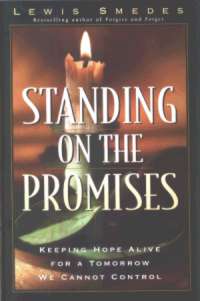Standing On The Promises
Dr. Lewis B. Smedes
Reviewed by Craig Bourne
 How
do caring persons enrich the hope of others? Does personal care lift human
hopefulness? These questions touch at the heart of many issues that will
be addressed at the International
Conference on Christian Care. A key speaker at the Conference is Dr.
Lewis B. Smedes, who will be talking on issues of Hope.
How
do caring persons enrich the hope of others? Does personal care lift human
hopefulness? These questions touch at the heart of many issues that will
be addressed at the International
Conference on Christian Care. A key speaker at the Conference is Dr.
Lewis B. Smedes, who will be talking on issues of Hope.
Thomas Nelson Publishers recently released a new book by Dr. Smedes, Standing On The Promises. In his new book, Dr. Smedes expertly helps the reader to understand and to embrace Hope.
 At the
outset, he defines hope as consisting of three necessary ingredients —
wishing, imagining, and believing. “To keep hope alive, we need all three.
One is two too few. Two is one too few. Hope needs the three of them together,
the way fire needs heat and fuel and oxygen — all three— to keep the flame
alive.”
At the
outset, he defines hope as consisting of three necessary ingredients —
wishing, imagining, and believing. “To keep hope alive, we need all three.
One is two too few. Two is one too few. Hope needs the three of them together,
the way fire needs heat and fuel and oxygen — all three— to keep the flame
alive.”
Hope is conceived by a wish, comes to life with a dream and is born full
term when we believe that the thing we wish for and imagine having is
possible for us to have. As we read through Part One of the book ( What
Everyone Needs To Know About Hope), we come to easily understand the nature
and effect of each of these hope “ingredients”. Dr. Smedes writes in a
natural, comfortable style, supported by anecdotes that amplify his point.
What
Everyone Needs To Know About Hope), we come to easily understand the nature
and effect of each of these hope “ingredients”. Dr. Smedes writes in a
natural, comfortable style, supported by anecdotes that amplify his point.
Dr. Smedes’ trust in God comes through strongly as he acknowledges the difficulty we have dealing with life’s daily trials—more so for those who do not have hope. He says, “We need to hope because God gave us the power to imagine the future but gave us no power to control it.”
And because we cannot control most of our life experiences, we worry. We imagine the future; we hope for certain things to happen, but we fear that they may not turn out as we want. Dr. Smedes says “hope is always shadowed by worry that the good things we imagine may not happen.”
But for those very reasons, we must hang onto hope. “Hope is a spiritual power that keeps us striving to achieve the things we hope for and keeps us waiting for the things we know we cannot achieve.”
While hoping, we must trust God to provide the answers that we most need. We can say that; we can think we believe that, but the truth is more frequently that we worry anyway. Dr. Smedes addresses this by helping us to understand that worrying goes hand in hand with hope. “When we stop hoping, we stop worrying.” In other words, what we should fear most is when we no longer worry. When we don’t worry, we don’t have any hope either.
In Part Two, Dr. Smedes discusses How Hopeful People Keep Their Hope Alive and in Part Three he looks at When God Gets Into Hope. We recommend Standing On The Promises as an excellent book at any time. However, you might further appreciate Dr. Smedes’ address at the International Conference on Christian Care if you have a chance to read it before you hear him speak.
Dr. Lewis B. Smedes is Professor Emeritus of Theology and Ethics at Fuller Theological Seminary in Pasadena, California and is the author of many best-selling Christian books, including Shame and Grace, Forgive and Forget, Mere Morality, The Art of Forgiving, A Pretty Good Person, Choices, and Caring and Commitment.